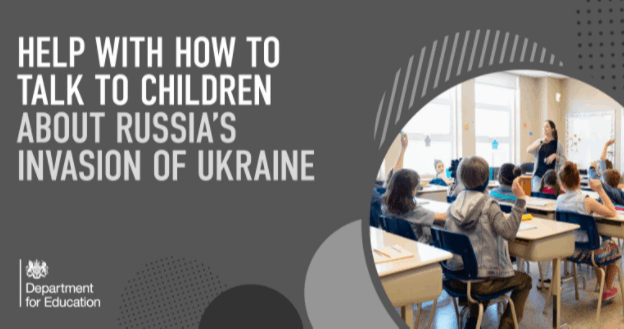War in Ukraine
War in Ukraine: how to support your child
We have collated some resources that will hopefully be useful for parents and carers when talking with their children about the invasion of Ukraine by Russia.

At First News our purpose has always been to provide children with a clear, age-appropriate understanding of what’s happening in the world. We know parents are searching for ways to explain to their children what’s happening in Ukraine, so this week’s issue has a 6-page special section.
Designed specifically to help parents and children understand what’s happening, First News presents the events in a non-sensationalised and unbiased way.
We also showcase some of the positive actions and people that have come out of this terrible event, to show children there are more good people than bad in the world.
Click HERE to view the children’s newspaper First News, which has a six-page special on Ukraine.

CBBC Newsround
If you are upset by the news, it’s important to know that you are not the only one and it’s OK to have those feelings.
You can rely on Newsround to tell you the important facts about a story – but some things you hear might be scary or make you feel worried.
Click HERE to read more.

BBC: Ukraine conflict: How to help yourself, your kids, and others
If you woke up this morning, looked at the news, and felt increasingly worried about the war in Ukraine, you are not alone. After a two-year pandemic, it’s a lot to absorb, and experts agree that feeling overwhelmed is normal.
Here is their advice on how you can take care of yourself, your kids – and others.
Click HERE to read more.

Gov.UK: Help for teachers and families to talk to pupils about Russia’s invasion of Ukraine and how to help them avoid misinformation.
Russia’s invasion of Ukraine is distressing and concerning, and we understand children and young people may have questions or be seeking reassurance. We know that schools are well placed to talk to pupils about the images they are seeing and help them navigate the concepts and issues this brings up but we’re also aware that it raises issues some schools and teachers may never have encountered before.
HERE we share some useful advice and resources for schools and teachers – but they may also be useful for families and young people themselves.

The Russian invasion of Ukraine
There has been a lot to weigh on the hearts and minds of individuals and families around the world.
If you are a parent, grandparent, teacher or educator, you may ask yourself: Should I talk to kids about these world events? As both child psychologists and parents, we have grappled with this question too. In these times, it can be hard to know whether or not to discuss these issues with our children, and if we do, how should we go about doing it?
As the world navigates challenges and crises, we need to have a blueprint for how to have open and honest discussions with our kids so they can grow up as informed and thoughtful world citizens. HERE we provide some ideas for engaging in conversations about the Ukraine invasion with kids, and how to tailor them based on age and maturity levels.

Ukraine invasion: How do you speak to children about Russia’s war?
Russia’s invasion of Ukraine has shocked the world and dominated news coverage across online, TV and newspapers for the past week. And with Vladimir Putin having raised the chilling prospect of a nuclear option, many will feel understandably anxious.
Bloodshed in Ukraine and headlines about the threat posed by nuclear weapons have been dominating the news for days.
Inevitably, this leads to questions from curious and sometimes anxious children – questions which many adults would struggle to give balanced and nuanced answers to.
Click HERE to read more.

NPR: What to say to kids when the news is scary
While it’s important to limit your kids’ exposure to potentially frightening media, some stories are simply too big to avoid. And as kids get older, if they don’t hear about it at home, they’ll almost certainly hear something from classmates at school.
We spoke with a handful of child development experts about what parents, teachers and other caregivers can do to help prepare and protect kids from all the scary news out there, whether it’s fighting overseas, a school shooting, devastating wildfire or a global pandemic.
Click HERE to see what they had to say:









